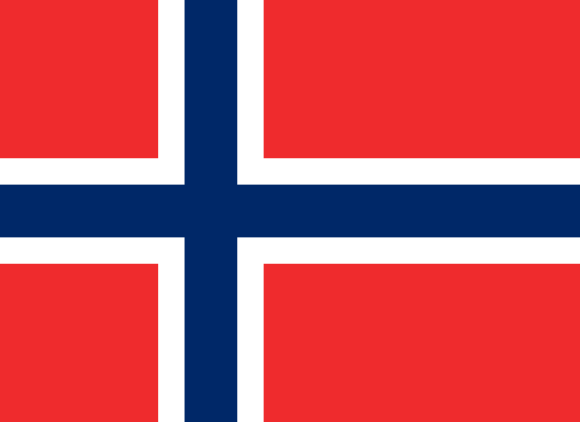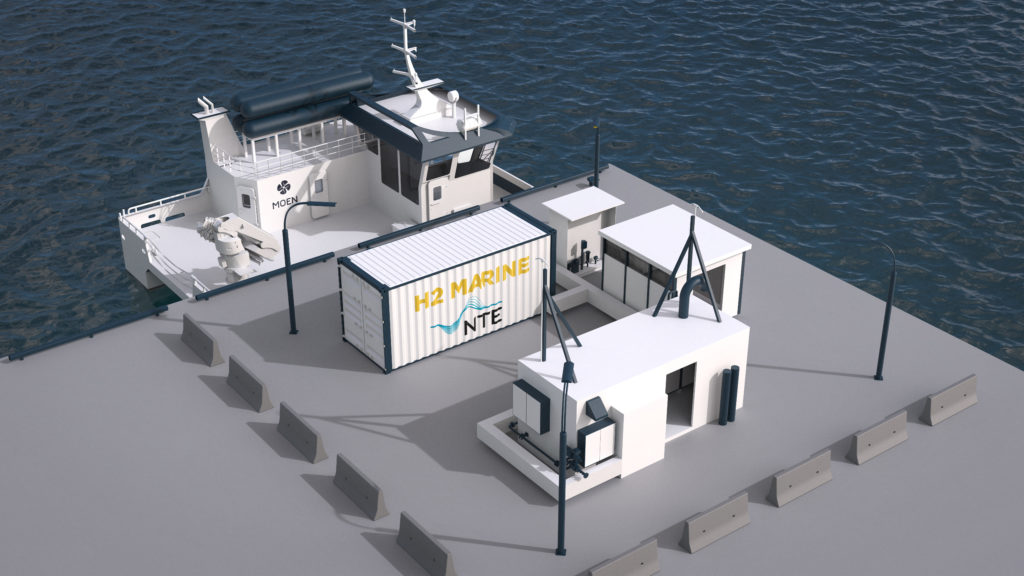We’re developing a complete hydrogen value chain for the maritime sector, enabling a fast-track market introduction for hydrogen vessels.
Through the project “Zero-emissions fish farm vessel”, the project partners will develop and build a hydrogen-electric service vessel for the aquaculture industry, as well as infrastructure and a complete solution for a flexible supply of green hydrogen as a maritime fuel.
Based on existing technologies, we are developing new solutions to achieve the most flexible and cost-effective solution
for producing and distributing hydrogen. This includes a hydrogen-electric fish farm vessel, the first of its kind, as well as a scalable facility for local production of green hydrogen and a combined mobile unit for storage and distribution. With our innovative solutions, we will be able to produce and distribute hydrogen at a competitive price – even at low production volumes.
ENOVA, Innovation Norway, and the Norwegian Research Council have allocated more than NOK 28 million to the project through the national Pilot-E programme.
Key points
- Significantly reduction of emissions from aquaculture and fish farming
- The vessel itself will reduce emissions by approx. 230 000 kg C02 per year compared to conventional fish farm vessels
- Joint venture with leading industry actors representing the entire value chain – from hydrogen production to aquaculture
- Highly scalable solution that can be adapted for other vessel segments and end-users
- Substantial market potential for all partners, both nationally and globally
The project has two main parts:
- A zero-emissions service vessel: Development and realization of a hydrogen-electric service vessel for the fish farming industry.
- Land facilities: Development and realization of an overall flexible and modular solution for the production, storage, and distribution/bunkering of green hydrogen, which enables the lowest possible hydrogen price.
The project differs from previous and ongoing research and demonstration projects in that the development will mainly be driven by industry stakeholders keen to develop and adopt products and solutions for commercial operation along the entire value chain.
Moen Gruppen is the project owner and will build the vessel at Moen Verft in Nærøysund Municipality. Development and ship design is carried out by Moen Marin. NTE and H2 Marine will develop a scalable solution for the production and supply of hydrogen as an emission-free and competitive alternative to diesel. SINTEF leads the research work of the project, which started as an initiative from the renewable energy cluster RENERGY.
The fish farming company Salmonor will buy and operate the new zero-emissions vessel. In all likelihood, they will be one of the first private companies in the world to use hydrogen service vessels.
Hydrogen infrastructure doesn’t need to be expensive
Through cost reduction in all production and distribution stages, from hydrogen to vessels, hydrogen will be able to become a cost-effective and environmentally friendly alternative to diesel.
The consortium gathers companies from the whole value chain – from hydrogen production to bunkering and aquaculture. This means that both producers of hydrogen, as well as consumers, are cooperating to develop an economically and environmentally sustainable alternative to fossil fuels.
Project partners H2 Marine and NTE are developing innovative and cost-effective production and bunkering solutions:
- As few components as possible
- Approx. 15–20 % lower CAPEX
- Lower OPEX; approx. 5 % lower power consumption
- Mobile combined storage and bunkering unit
- Flexible and scalable
Significant market potential
Hydrogen production is expected to be an enormous market and an important zero-emissions solution for the maritime sector. The Norwegian Shipping Association’s goal is for 50% of the fleet to have zero emissions by 2030, and to be carbon neutral by 2050. For the maritime nation of Norway, the decarbonization of the maritime sector will provide great opportunities.
Knowledge developed through the project will be directly transferable to other vessel segments. In the first instance, short-haul transport will be the areas where it is possible to switch to zero emissions; ferries, the Kystruten, fast boats, fishing boats, aquaculture boats, supply and cargo ships. Within several of these vessel types, Norway is far ahead in developing zero-emission vessels. Maritime hydrogen technology has so far only been demonstrated in one project worldwide, and never in a comprehensive value chain that this project encompasses. The project partners, and Norway, will therefore be able to become an international leader in technology and system delivery and sales of hydrogen for maritime purposes.
It is estimated that the market for location and service vessels in the Norwegian aquaculture industry today is around 900 vessels. However, the solutions that the project will develop are not limited to just one industry, but are scalable and will enable emission-free maritime transport aimed at several operational needs in both national and international markets.
Project partners
- Moen Verft
- SalMar
- Moen Marin
- H2 Marine
- NTE Energi AS
- RENERGY – Renewable Energy Cluster
Project participants:
- Gexcon
- NELL
- Hexagon
- ZEM
- Marine Design
- SINTEF
- Aragon
- Maximator
- WEH


